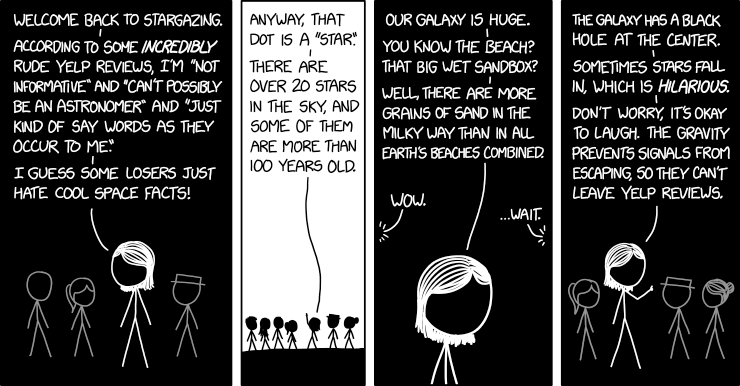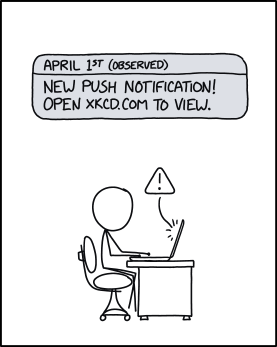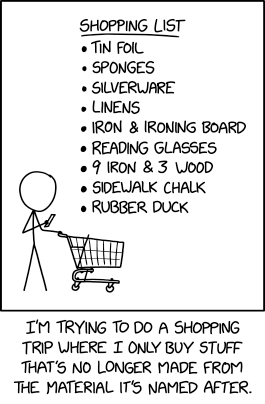********** XKCD **********
return to top
Tariffs![[later] I don't get why our pizza slices have such terrible reviews; the geotextile-infused sauce gives the toppings incredible slope stability! [later] I don't get why our pizza slices have such terrible reviews; the geotextile-infused sauce gives the toppings incredible slope stability!](https://imgs.xkcd.com/comics/tariffs.png)
Match ID: 0 Score: 1000.00 source: xkcd.com
qualifiers: 1000.00 xkcd
Stargazing 4
Match ID: 1 Score: 1000.00 source: xkcd.com
qualifiers: 1000.00 xkcd
Push Notifications
Match ID: 2 Score: 1000.00 source: xkcd.com
qualifiers: 1000.00 xkcd
Anachronym Challenge
Match ID: 3 Score: 1000.00 source: xkcd.com
qualifiers: 1000.00 xkcd
Filter efficiency 99.595 (4 matches/987 results)
********** TRAVEL **********
return to top
Holy water brimming with cholera compels illness cluster in Europe
Fri, 11 Apr 2025 18:59:21 +0000
Testing found that the holy water was "heavily contaminated."
Match ID: 0 Score: 35.00 source: arstechnica.com age: 0 days
qualifiers: 35.00 travel(|ing)
Boarding passes and check-in could be scrapped in air travel shake-up
Fri, 11 Apr 2025 16:57:16 GMT
Facial recognition and a ‘journey pass’ stored on passengers’ phones are part of UN-backed plans to digitise air transport
The days of fumbling around for your boarding pass or frantically checking in for a flight on the way to the airport could soon be over under imminent plans to overhaul the way we travel.
The International Civil Aviation Organization (ICAO), the UN body responsible for crafting airline policy, plans to dramatically shake up existing rules for airports and airlines through the introduction of a “digital travel credential”.
Continue reading...HBO renewed Mike White’s hit drama before third season aired and rumours abound about luxury settings and return of stars
You’ve only just got home from a holiday when you start planning the next one. So it is with the super-rich spa satire The White Lotus. The gunsmoke is still clearing from the finale of the third season but speculation is rife about where the HBO hit will head next.
This week’s climax of Mike White’s drama might have divided critics, but it was still group chat-dominating, column inch-gobbling TV, notching its highest ratings yet. The show was renewed for a fourth trip before the third had even aired, with White reportedly pitching HBO execs his next idea while still filming in Koh Samui. Buzz is now building about the next chapter, expected on our screens in late 2026.
Continue reading...Elzbieta Olszewska had previously been told she faced deportation after mistakenly filling in form online
A Polish woman who had her application to remain in the UK rejected because she mistakenly filled in a form online instead of on paper has been granted permission to stay in Britain after a change of mind by the Home Office.
Elzbieta Olszewska, 80, had been living alone in her flat in Warsaw before arriving in the UK last September. Her only child, Michal Olszewski, 52, an aeronautical engineer and dual British-Polish citizen, who lives in Lincoln with his wife, had been travelling regularly to the Polish capital to support his mother.
Continue reading...After dysentery killed their mother and the civil war came to their home in Omdurman, Haroun and his young siblings were forced to set off on an epic quest to reach El Geneina
They were huddled together on the bare floor of an abandoned house – four orphans who had travelled nearly 1,000 miles after having to flee from their home in the city when Sudan’s brutal civil war erupted.
Having escaped ferocious fighting around Omdurman, twin city of the capital, Khartoum, they had arrived in Darfur, the sprawling region in western Sudan that has become synonymous with ethnic cleansing, massacres of civilians and widespread gang-rape and sexual violence during the ongoing conflict between Sudan’s armed forces and the paramilitary Rapid Support Forces (RSF).
Continue reading...Imagine that all of us—all of society—have landed on some alien planet and need to form a government: clean slate. We do not have any legacy systems from the United States or any other country. We do not have any special or unique interests to perturb our thinking. How would we govern ourselves? It is unlikely that we would use the systems we have today. Modern representative democracy was the best form of government that eighteenth-century technology could invent. The twenty-first century is very different: scientifically, technically, and philosophically. For example, eighteenth-century democracy was designed under the assumption that travel and communications were both hard...
Daughter of Peter and Barbie Reynolds, 79 and 75, says they have ‘no idea’ why they have been in jail for two months
An elderly British couple taken captive by the Taliban have been interrogated 29 times since they were imprisoned more than two months ago, and still have “absolutely no idea” why they have been incarcerated, their daughter has said.
No charges have been brought against Peter Reynolds, 79, and his wife, Barbie, 75, who ran school training programmes and were arrested alongside an American friend, Faye Hall, as they travelled to their home in Bamyan province, in central Afghanistan, in February.
Continue reading...Switzerland is leading the world in purifying its water of micropollutants, a concoction of chemicals often found in bodies of water that look crystal clear. They include common medicines like antidepressants and antihistamines, but have unknown and potentially damaging consequences for human and ecosystem health.
In the second of a two-part series, Phoebe Weston travels to Geneva to find out how the country has transformed its rivers from sewage-filled health hazards to pristine swimming spots. She tells Madeleine Finlay how a public health disaster in the 1960s spurred the government to act, and what the UK could learn from the Swiss about taking care of a precious national asset.
From sewage and scum to swimming in ‘blue gold’: how Switzerland transformed its rivers
Support the Guardian: theguardian.com/sciencepod
Students from Muslim-majority countries as well as Asia and Africa are having their visas revoked with little or no explanation.
The post Trump Appears to Be Targeting Muslim and “Non-White” Students for Deportation appeared first on The Intercept.
Just weeks away from graduation, some international students at Arizona State University have been blocked from completing degrees.
The post At Least 50 Arizona State Students Have Now Had Visas Revoked, Lawyer Says appeared first on The Intercept.
From biking adventures to city breaks, get inspiration for your next break – whether in the UK or further afield – with twice-weekly emails from the Guardian’s travel editors. You’ll also receive handpicked offers from Guardian Holidays.
From biking adventures to city breaks, get inspiration for your next break – whether in the UK or further afield – with twice-weekly emails from the Guardian’s travel editors.
You’ll also receive handpicked offers from Guardian Holidays.
Continue reading...Guardian Australia is highlighting the plight of our endangered native species during an election campaign that is ignoring broken environment laws and rapidly declining ecosystems
Nearly 2m hectares of forests suitable for endangered koalas have been destroyed since the iconic species was declared a threatened species in 2011, according to analysis for Guardian Australia.
The scale of habitat destruction in Queensland and New South Wales – states in which the koala is formally recognised as being at risk of extinction – has continued despite political promises it would be protected.
Get Guardian Australia environment editor Adam Morton’s Clear Air column as an email
Continue reading...A rum espresso martini topped with white and dark chocolate shavings to give it an extra Easter edge
Coffee and chocolate go together almost as well as Easter and chocolate, and the use of dark and white chocolate shavings in this broody number give the drink a nice point of contrast, as well as different aromas.
Giorgia Di Stefano and Saira Khan, Demon, Wise & Partners, London EC2
Continue reading...What to drink with your Easter eggs
I spend quite a lot of Easter-time licking chocolate out of my molars, and using every reflective surface to check that my teeth haven’t dissolved. When chocolate is necessary, so is a wine that cleanses the palate, to drink alongside and to complement its flavours.
Chocolate is one of those foodstuffs that really coats the palate, which can make it difficult to enjoy anything much else; its sweetness can also ramp up the perceived bitterness, alcohol and acidity in a wine, and make it taste disagreeable. And it’s those factors that make people think chocolate is rather limited in terms of wine-pairing options.
Continue reading...Precise, timeworn food without making a huge song and dance about it
A trip to the coast felt in order when the temperature recently suggested that we, the residents of the United Kingdom, have survived another winter. Behold: sunshine, green shoots, cherry blossom, fresh hope and all that good stuff. And, soon, a glut of bank holidays during which we can unveil our factor 50-smeared knees at the seaside and quickly declare that it’s far too hot.
But not all British seaside experiences are built the same. Nibbling a Waldorf salad while sipping a glass of Oxney organic English sparkling at the charming Harry’s at the Gallivant hotel on the East Sussex coast is not remotely similar to scoffing a battered sausage on Blackpool front. Both have their merits, but Harry’s is a far more refined affair, it being a recently restyled and renamed restaurant inside a blissful, bougie boutique hotel. This is a hotel, incidentally, that will create a sort of Famous Five Do Santa Monica seaside experience for you, albeit at a price. Cocktails on the sand dunes? They’ll mix and pack them in flasks, and find you suitable garments to wear, too. A spot of flow yoga before your breakfast ginger shot? Not a problem, madam. Then, later on, dinner at Harry’s by Matthew Harris, once of Bibendum (and, incidentally, brother of Henry of Bouchon Racine fame), for a menu that focuses on the heartier, homelier side of classic French cookery. Terrine de campagne with pistachios, oysters with sauce mignonette, braised rabbit in riesling and St Émilion au chocolat for pudding, that kind of thing.
Continue reading...Our baker’s take on the viral bar is made with vermicelli pastry, dark chocolate and white chocolate pistachio cream. It’s simple. Just chill!
This is my take on the viral sensation originally created by Dubai-based chocolatier Sarah Hamouda, founder of Fix Dessert Chocolatier. Her ingenious bar, filled with crunchy kataifi pastry and a luscious pistachio cream, took the internet by storm with its well-balanced flavour combination and addictive texture. I’ve skipped ready-made pistachio cream in favour of a homemade blend, which is free from artificial colours and flavours, and if you can’t find kataifi pastry (it’s normally available fresh in international supermarkets), Shredded Wheat makes an excellent substitute. The result is a luxurious, crunchy treat that’s perfect for sharing – it stores well, too.
Continue reading...Foreign ministers will gather in London and seek to exert diplomatic pressure demanding a ceasefire
The British government is bringing together foreign ministers from nearly 20 countries and organisations in an attempt to establish a group that can drive the warring factions in Sudan closer towards peace.
The conference at Lancaster House in London on 15 April comes on the second anniversary of the start of a civil war that has led to the world’s biggest humanitarian crisis, but has been persistently left at the bottom of the global list of diplomatic priorities. Half of Sudan’s population are judged to be desperately short of food, with 11 million people internally displaced.
Continue reading...A weekly email from Yotam Ottolenghi, Meera Sodha, Felicity Cloake and Rachel Roddy, featuring the latest recipes and seasonal eating ideas
Each week we’ll send you an exclusive newsletter from our star food writers. We’ll also send you the latest recipes from Yotam Ottolenghi, Nigel Slater, Meera Sodha and all our star cooks, stand-out food features and seasonal eating inspiration, plus restaurant reviews from Grace Dent and Jay Rayner.
Sign up below to start receiving the best of our culinary journalism in one mouth-watering weekly email.
Continue reading...What happens when western billionaires try to ‘fix’ hunger in developing countries? Neelam Tailor investigates how philanthropic efforts by the Gates Foundation, the Rockefeller Foundation and the organisation they set up to revolutionise African farming, the Alliance for a Green Revolution in Africa (Agra), may have made matters worse for the small-scale farmers who produce 70% of the continent's food.
From seed laws that criminalise traditional practices to corporate partnerships with agribusiness giants such as Monsanto and Syngenta, we explore how a well-funded green revolution has led to rising debt, loss of biodiversity and deepening food insecurity across the continent
Continue reading...Plastics are everywhere, but their smallest fragments – nanoplastics – are making their way into the deepest parts of our bodies, including our brains and breast milk.
Scientists have now captured the first visual evidence of these particles inside human cells, raising urgent questions about their impact on our health. From the food we eat to the air we breathe, how are nanoplastics infiltrating our systems?
Neelam Tailor looks into the invisible invasion happening inside us all
Continue reading...Style, with substance: what’s really trending this week, a roundup of the best fashion journalism and your wardrobe dilemmas solved, direct to your inbox every Thursday
Style, with substance: what’s really trending this week, a roundup of the best fashion journalism and your wardrobe dilemmas solved, delivered straight to your inbox every Thursday
Explore all our newsletters: whether you love film, football, fashion or food, we’ve got something for you
Continue reading... |
Imagine a world in which you can do transactions and many other things without having to give your personal information. A world in which you don’t need to rely on banks or governments anymore. Sounds amazing, right? That’s exactly what blockchain technology allows us to do.
It’s like your computer’s hard drive. blockchain is a technology that lets you store data in digital blocks, which are connected together like links in a chain.
Blockchain technology was originally invented in 1991 by two mathematicians, Stuart Haber and W. Scot Stornetta. They first proposed the system to ensure that timestamps could not be tampered with.
A few years later, in 1998, software developer Nick Szabo proposed using a similar kind of technology to secure a digital payments system he called “Bit Gold.” However, this innovation was not adopted until Satoshi Nakamoto claimed to have invented the first Blockchain and Bitcoin.
A blockchain is a distributed database shared between the nodes of a computer network. It saves information in digital format. Many people first heard of blockchain technology when they started to look up information about bitcoin.
Blockchain is used in cryptocurrency systems to ensure secure, decentralized records of transactions.
Blockchain allowed people to guarantee the fidelity and security of a record of data without the need for a third party to ensure accuracy.
To understand how a blockchain works, Consider these basic steps:
Let’s get to know more about the blockchain.
Blockchain records digital information and distributes it across the network without changing it. The information is distributed among many users and stored in an immutable, permanent ledger that can't be changed or destroyed. That's why blockchain is also called "Distributed Ledger Technology" or DLT.
Here’s how it works:
And that’s the beauty of it! The process may seem complicated, but it’s done in minutes with modern technology. And because technology is advancing rapidly, I expect things to move even more quickly than ever.
Even though blockchain is integral to cryptocurrency, it has other applications. For example, blockchain can be used for storing reliable data about transactions. Many people confuse blockchain with cryptocurrencies like bitcoin and ethereum.
Blockchain already being adopted by some big-name companies, such as Walmart, AIG, Siemens, Pfizer, and Unilever. For example, IBM's Food Trust uses blockchain to track food's journey before reaching its final destination.
Although some of you may consider this practice excessive, food suppliers and manufacturers adhere to the policy of tracing their products because bacteria such as E. coli and Salmonella have been found in packaged foods. In addition, there have been isolated cases where dangerous allergens such as peanuts have accidentally been introduced into certain products.
Tracing and identifying the sources of an outbreak is a challenging task that can take months or years. Thanks to the Blockchain, however, companies now know exactly where their food has been—so they can trace its location and prevent future outbreaks.
Blockchain technology allows systems to react much faster in the event of a hazard. It also has many other uses in the modern world.
Blockchain technology is safe, even if it’s public. People can access the technology using an internet connection.
Have you ever been in a situation where you had all your data stored at one place and that one secure place got compromised? Wouldn't it be great if there was a way to prevent your data from leaking out even when the security of your storage systems is compromised?
Blockchain technology provides a way of avoiding this situation by using multiple computers at different locations to store information about transactions. If one computer experiences problems with a transaction, it will not affect the other nodes.
Instead, other nodes will use the correct information to cross-reference your incorrect node. This is called “Decentralization,” meaning all the information is stored in multiple places.
Blockchain guarantees your data's authenticity—not just its accuracy, but also its irreversibility. It can also be used to store data that are difficult to register, like legal contracts, state identifications, or a company's product inventory.
Blockchain has many advantages and disadvantages.
I’ll answer the most frequently asked questions about blockchain in this section.
Blockchain is not a cryptocurrency but a technology that makes cryptocurrencies possible. It's a digital ledger that records every transaction seamlessly.
Yes, blockchain can be theoretically hacked, but it is a complicated task to be achieved. A network of users constantly reviews it, which makes hacking the blockchain difficult.
Coinbase Global is currently the biggest blockchain company in the world. The company runs a commendable infrastructure, services, and technology for the digital currency economy.
Blockchain is a decentralized technology. It’s a chain of distributed ledgers connected with nodes. Each node can be any electronic device. Thus, one owns blockhain.
Bitcoin is a cryptocurrency, which is powered by Blockchain technology while Blockchain is a distributed ledger of cryptocurrency
Generally a database is a collection of data which can be stored and organized using a database management system. The people who have access to the database can view or edit the information stored there. The client-server network architecture is used to implement databases. whereas a blockchain is a growing list of records, called blocks, stored in a distributed system. Each block contains a cryptographic hash of the previous block, timestamp and transaction information. Modification of data is not allowed due to the design of the blockchain. The technology allows decentralized control and eliminates risks of data modification by other parties.
Blockchain has a wide spectrum of applications and, over the next 5-10 years, we will likely see it being integrated into all sorts of industries. From finance to healthcare, blockchain could revolutionize the way we store and share data. Although there is some hesitation to adopt blockchain systems right now, that won't be the case in 2022-2023 (and even less so in 2026). Once people become more comfortable with the technology and understand how it can work for them, owners, CEOs and entrepreneurs alike will be quick to leverage blockchain technology for their own gain. Hope you like this article if you have any question let me know in the comments section
FOLLOW US ON TWITTER
Imagine that all of us—all of society—have landed on some alien planet and need to form a government: clean slate. We do not have any legacy systems from the United States or any other country. We do not have any special or unique interests to perturb our thinking. How would we govern ourselves? It is unlikely that we would use the systems we have today. Modern representative democracy was the best form of government that eighteenth-century technology could invent. The twenty-first century is very different: scientifically, technically, and philosophically. For example, eighteenth-century democracy was designed under the assumption that travel and communications were both hard...
Students from Muslim-majority countries as well as Asia and Africa are having their visas revoked with little or no explanation.
The post Trump Appears to Be Targeting Muslim and “Non-White” Students for Deportation appeared first on The Intercept.
She lost her job at Emerson College after screening a film critical of Israel. Her lawsuit seeks to leverage an unusual Massachusetts free speech law.
The post This College Staffer Lost Her Job After Showing a Film Critical of Israel. Now She’s Suing Over Free Speech. appeared first on The Intercept.
RSS Rabbit links users to publicly available RSS entries.
Vet every link before clicking! The creators accept no responsibility for the contents of these entries.
Relevant
Fresh
Convenient
Agile
We're not prepared to take user feedback yet. Check back soon!